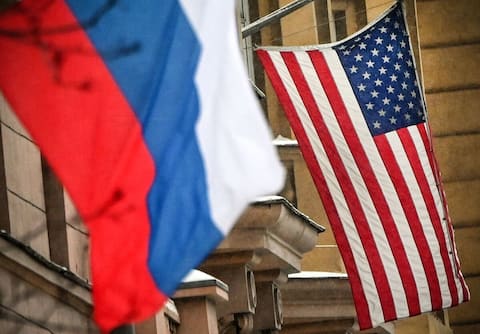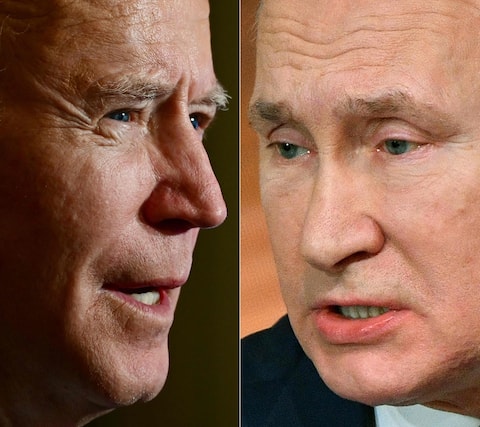Biden-Putin two-hour summit to avoid escalation in Ukraine

Joe Biden and Vladimir Putin had a high-stakes exchange for two hours on Tuesday, and the main issue at stake was fears of a military escalation in Ukraine.
• Read also: Biden-Putin talks: Russia’s intentions in Ukraine
• Read also: “I don’t think you have a soul”
Russian news agencies announced the end of the conversation, then the White House said that the interview ended at 5:08 pm GMT, without giving any immediate indication of its content.
The discussion between the US and Russian presidents began at 3:07 pm GMT, according to Washington, with the exchange of courtesies broadcast on Russian television.
“Nice to see you again,” Joe Biden said.
Welcome, Mr. President, said Vladimir Putin, smiling, sitting at a long table in front of a screen on which his counterpart appeared. The Russian president was at his residence in the Black Sea port city of Sochi.
The US president participated in the conversation from the White House Situation Room, a highly secure room where the US CEO controls sensitive military interventions, and closed to reporters.
His National Security Adviser Jake Sullivan will answer questions from the press at 7 pm GMT.
The United States, accused of going it alone during the withdrawal from Afghanistan and carrying out some international issues without much concern for its allies, insists very strongly on its close coordination with the Europeans and the Ukrainians.
Joe Biden will call French President Emmanuel Macron, German Chancellor Angela Merkel, Italian Prime Minister Mario Draghi and Britain’s Boris Johnson on Tuesday after his talks with Vladimir Putin.
He had already spoken with those allies on Monday and agreed to stay “in close contact”.
On Monday, the CEO of the United States announced that Joe Biden should also, in the coming days, report on the conversation to Ukrainian President Volodymyr Zelensky.
‘stable’ and ‘predictable’
The US president’s hope for a “stable” and “predictable” relationship with Russia, expressed in June during a personal summit between the two men in Geneva, appears to have lived on, at least for the time being.
Washington, NATO and Kiev accuse Moscow of massing troops on the border with Ukraine to attack the country. The scenario is reminiscent of 2014 and the Russian annexation of Crimea, then the outbreak of armed conflict in eastern Ukraine that left more than 13,000 people dead.
The Kremlin denies any plans for an invasion. Moscow accuses Washington of neglecting its own concerns: NATO’s increased activity in the Black Sea, Ukraine’s desire to join NATO, and Kiev’s ambition to arm itself with the West.
“Russia never intended to attack anyone, but we have red lines,” Kremlin spokesman Dmitry Peskov emphasized Monday.
Many observers, in Europe and the United States, believe that Vladimir Putin is deceiving in deploying troops to Ukraine’s borders, but few have completely ruled out the possibility of an attack.
If Moscow takes action, a senior White House official has warned that the United States will “respond positively” to the demand to increase the US military presence in Eastern Europe and provide more support to the Ukrainian military.
Washington is also threatening to impose economic sanctions on the Russian regime. He guarantees that it will be more painful than the one that has accumulated without much impact on Russia since 2014.
“We know very well that the US side is dependent on sanctions,” a Kremlin spokesman said sarcastically on Tuesday.
European Commission President Ursula von der Leyen warned Tuesday that the European Union is also ready to adopt additional sanctions against Russia.
The virtual Biden-Putin summit is already a success for Russia, which claims to be an inescapable geopolitical power and thus, at least temporarily, is tearing the US president away from his main strategic priority, the rivalry with China.
It’s been a few weeks since the Kremlin called for a face-to-face meeting between the two presidents.
Outside Ukraine, strategic stability and control of nuclear weapons, hacking and cyber security, and Iran’s nuclear power were on the list of topics likely to be discussed on Tuesday.
“It is clear that when two presidents turn towards dialogue, it is because they want to discuss problems and do not aim to reach a dead end,” Dmitry Peskov noted. “But we should not expect immediate breakthroughs,” he warned.
see also

Typical creator. Subtly charming web advocate. Infuriatingly humble beer aficionado.










